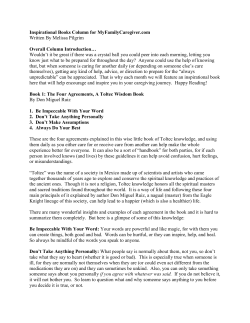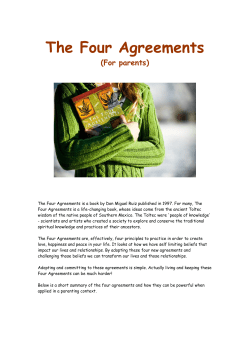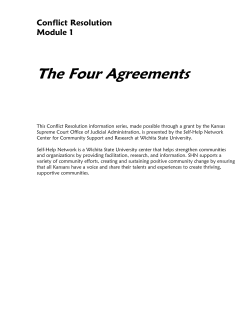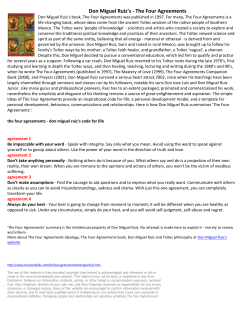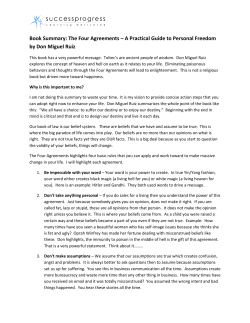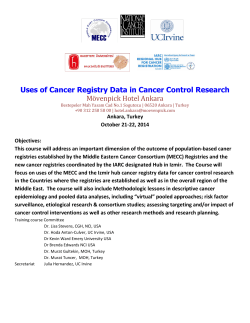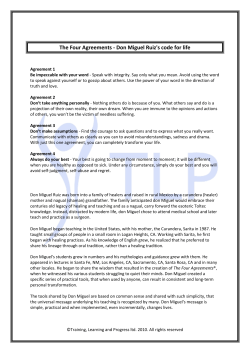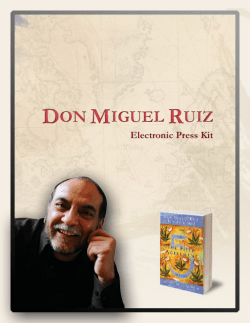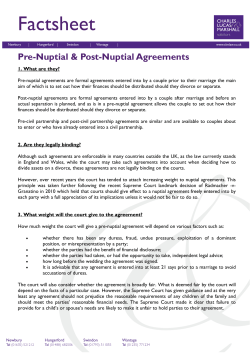
The Four Agreements: A Toltec Wisdom Book Review by: Hoda Alnimr
The Four Agreements: A Toltec Wisdom Book BY DON MIGUEL RUIZ AMBER-ALLEN PUBLISHING © 1997 · 138 PAGES ---------------------------- Review by: Hoda Alnimr Very simple, very effective, and very "four"! These are the four agreements that we are going to explore briefly. Before that, it is worth mentioning that the author, Don Miguel Ruiz, is Mexican; this is where the word "Toltec" comes from: people of central and southern Mexico. Other than that, it is simply a wisdom book! Enjoy! The 4 Agreements: “The First Agreement: Be Impeccable with Your Word The Second Agreement: Don’t Take Anything Personally The Third Agreement: Don’t Make Assumptions The Fourth Agreement: Always Do Your Best.” Hoda Alnimr A Quick Breakdown of the 4 Agreements! 1. Be Impeccable with Your Word: “Impeccability means ‘without sin.’ […] Everything you feel or believe or say that goes against you is a sin. You go against yourself when you judge or blame yourself for anything... Being impeccable is not going against yourself. When you are impeccable, you take responsibility for your actions, but you do not judge or blame yourself.” In other words, to be impeccable with your words, when it comes to dealing with your own self, is to stop lashing yourself with depressing words at each mistake you make, to cease the flow of negative messages to your subconscious mind, to be more receptive and welcoming of who you are; yes, acknowledging your mistakes and flaws, but then moving ahead to rectify and construct. You are impeccable with your words, as far as others are concerned, when you live up to your promises and commitments, regardless of whom you are dealing with, you honour your own word, and you shoulder your responsibility till the very end. You never promise or vow a commitment when you do not really intend to follow up; then you are impeccable with your words. Also, you "criticize" others mistakes as gently as you do your own J when you are impeccable with your word. 2. Don’t Take Anything Personally “When you make it a strong habit not to take anything personally, you avoid many upsets in your life." Seeking the approval of all is unquestionably impossible. Much as you cannot guarantee everyone's "personal" satisfaction with, so it is true that you are not the "very" cause behind every upset face. In a few words, whenever someone praises or criticizes you, always bear in mind that there may be some truth in their words; weigh it up, break it down, and consider it always a chance to better or refresh yourself. The trick here is that this applies both to criticism and praise, as both may well be either constructive or destructive! Hoda Alnimr 3. Don’t Make Assumptions “We have the tendency to make assumptions about everything. The problem with making assumptions is that we believe they are the truth. We could swear they are real. We make assumptions about what others are doing or thinking—we take it personally—then we blame them and react by sending emotional poison with our word. That is why when we make assumptions, we’re asking for problems. We make an assumption, we misunderstand, we take it personally, and we end up creating a whole big drama for nothing.” Very wise and very true! What does the author suggest we should do about that? “The way to keep yourself from making assumptions is to ask questions. Make sure the communication is clear. If you don’t understand, ask. Have the courage to ask questions until you are as clear as you can be.” 4. Always Do Your Best “There is just one more agreement, but it’s the one that allows the other three to become deeply ingrained habits. The fourth agreement is about the action of the first three: Always do your best.” “Under any circumstance, always do your best, no more and no less. But keep in mind that your best is never going to be the same from one moment to the next. Everything is alive and changing all the time, so your best will sometimes be high quality, and other times it will not be as good.” This is quite a valid point we seldom pay attention to. Another valid point about doing your best is that: "best" is by no means a synonym to "should." That is, doing your very best needs not mean doing what should be done. The essence of your best is what you yourself know you are capable of. Brian Johnson, a philosopher commenting on this book, says, "Think about it. When what you’re doing is less than what you’re capable of doing—and I’m not talking about what you “should” be doing here, but what your Highest Self *knows* you’re capable of—there’s a gap. And, in that gap is where depression and anxiety and disillusionment hang out. Hoda Alnimr When we close that gap by doing our best, there’s no room for the angst/negative /etc. and we feel REALLY good." I One Moment, Please! It seems a common tendency to believe that what should be done is "better" or "higher" that what we are truly capable of. That is, we take it for granted that "our best" may not be up to the requirements or common standards. A good example is the filed of customer service. We call it an "extra mile" to do something beyond "the required." In effect, that extra mile is nothing short of than our "real" best. When you decide to follow up or take responsibility to its full, this is when you practise "what your highest self knows you are capable of"; in which case, your best is way higher and more sublime than the required. There nothing "extra" there, I believe; we simply realize and put our full potentials into effect when WE, ourselves, decide to take ownership of those potentials. We think we are exerting some "extra" effort because we do not frequently "choose" to realize our FULL potentials, do what we are really capable of; that is, do our very best. Always do your best; always do what you are capable of. Hoda Alnimr Beautiful Quotes from the Book: “Death is not the biggest fear we have; our biggest fear is taking the risk to be alive—the risk to be alive and express what we really are.” “Nobody abuses us more than we abuse ourselves.” “If you want to live a life of joy and fulfillment, you have to find the courage to break those agreements that are fear-based and claim your personal power.” Fragrant Regards,,, Hoda Alnimr Jan 2011 Hoda Alnimr
© Copyright 2025
